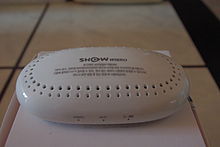WiBro
Appearance
This article needs to be updated. (March 2016) |
| WiBro | |
 Wibro Egg sold by KT, produced by Interbro | |
| Korean name | |
|---|---|
| Hangul | 와이브로 |
| Revised Romanization | waibeuro |
| McCune–Reischauer | waibŭro |

WiBro (wireless broadband) is a
802.16e (mobile WiMAX) international standard. By the end of 2012, the Korean Communications Commission intends to increase WiBro broadband connection speeds to 10 Mbit/s, around ten times the 2009 speed, which will complement their 1 Gbit/s fibre-optic network.[1] The WiBro networks were shut down at the end of 2018.[2][3]
WiBro adopts
KT, SKT
) launched commercial service in June 2006, and the monthly fees were around US$30.
WiBro
TVA
(Brazil), Omnivision (Venezuela), PORTUS (Croatia), and Arialink (Michigan) provided commercial service at some stage. While WiBro is quite precise in its requirements from spectrum use to equipment design, WiMAX leaves much of this up to the equipment provider while providing enough detail to ensure interoperability between designs.
WiBro has a Peak Download speed of 128 Mbit/s and a Peak Upload speed of 56 Mbit/s.
Current service
In Korea, KT (
WiFi hotspots, ollehWiFi. The service coverage is advertised as nationwide, but actual coverage is restricted to every city, some railroad station, airports, and major highways. SK Telecom
also offers Wave 2 WiBro Service for $18.87 a month with 30 GB data usage. Actual service coverage is limited mostly to major cities and highways.
For short term visitors, KT rents WiBro modem and bridge at KT Roaming Center in Incheon International Airport. As of October 2012, WiBro-only USB modem costs 5,000 KRW per day plus 100,000 KRW deposit, WiBro-HSPA USB modem and WiBro Egg cost 8,000 KRW per day plus 150,000 KRW deposit. One-day rent is free at KT Roaming Center, and requires credit card and passport.
In India,
Tikona Digital Networks
(Independent services provider) offers WiBro service for up to 2 Mbit/s and 4 Mbit/s in many cities. The 2 Mbit/s unlimited monthly plan costs Rs. 999.00 (roughly $21).
Coverage
In January 2013, KT covers all 80+ cities while SK covers Seoul and a few other major cities in South Korea. However, WiBro service is officially closed at the end of 2018.
Wibro Manufactures
- HTC - HTC Evo 4G+
- INFOMARK - Compact Egg (Mobile router)
- Interbro - Egg (A mobile Wibro to Wi-Fi hotspot device brand)
- Intel - Wibro Netbook
- LG Innotek - Egg, USB Type Modem
- Modacom - Egg
- Myungmin - USB Type Modem
- Samsung - USB Type Modem, Wibro 3G phone (SCH-M830, Show Wibro Omnia)
- Iphone4 - USIM
Network deployment
In November 2004,
Telecom Italia, the dominant telephony and internet service provider in Italy, together with Korean Samsung Electronics, has demonstrated to the public a WiBro network service on the occasion of the 2006 Winter Olympics, held in Turin, with downlink speed of 10 Mbit/s and uplink speed of some hundreds of kbit/s even in movement up to 120 km/h.[6] In the same event Samsung tlc div. president Kitae Lee assured a future of 20–30 Mbit/s by the end of this year (2006) and >100 Mbit/s down/>1 Mbit/s up in 2008.[6] KT Corporation launched commercial WiBro service in June 2006.[7] Sprint (US), BT (UK), KDDI (JP), and TVA (BR) have or are trialing WiBro. KT Corporation and SK Telecom launched WiBro around Seoul on June 30, 2006. On April 3, 2007, KT launched WiBro coverage for all areas of Seoul including all subway lines
. In January 2011, KT's mobile network SHOW and home network QOOK merged. Since then, KT has been changed to olleh. In March, 2011, olleh's WiBro coverage was expanded nationwide covering 85% of Koreans. As of October 2012, olleh's Wibro covers 88% of the South Korean population.
See also
- Digital Multimedia Broadcasting(DMB)
- HIPERMAN
- IEEE 802.16
- WiMAX
References
- ^ Malik, Om (February 1, 2009). "By 2012 Koreans Will Get 1Gbps Broadband Connections". Archived from the original on October 19, 2016.
- ^ "Adieu Korean Tech, Wibro". KoreaTechToday. January 2, 2019.
- ^ Cho, Mu-Hyun (December 7, 2018). "KT and SK Telecom to end WiBro service within the year". ZDNet.
- ^ Park, Cony (2004-11-15). "WiBro, WiMax get closer". iBiztoday.com. Archived from the original on January 10, 2005.
- ^ "Sprint, Samsung to Explore Wireless Broadband" (Press release). Sprint. September 16, 2005. Archived from the original on 2006-07-24. Retrieved 2008-09-11.
- ^ a b "Telecom Speed". Retrieved 16 July 2018.
- ^ "South Korea launches WiBro service". EE Times. 2006-06-30. Retrieved 2010-06-23.
External links
- WiBro Website (in English)
- Korea Telecom's WiBro site (in Korean) Archived 2015-05-13 at the Wayback Machine
- PDF file: 2.3 GHz Portable Internet (WiBro) for Wireless Broadband Access
- WiMAX: Opportunity or Hype? (a paper presented at the ITERA 2006 academic conference discussing WiBro and WiMAX)
- News report discussing WiBro technology Archived 2004-12-15 at the Wayback Machine
- News article about an alliance between SK Telecom and Hanaro Telecom for WiBro rollout
- News report about the LG/Intel agreement
- TTA (Telecommunications Technology Association) of Korea
- South Korea Pushes Mobile Broadband
- WiBro, HSDPA Providers Vying for Future Markets
